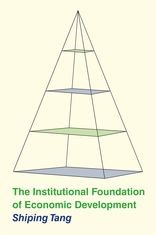 The Institutional Foundation of Economic Development
The Institutional Foundation of Economic Development
Contents
-
-
-
-
-
-
-
-
-
-
-
-
I. State Capacity and Governance: Conceptualization and Measurement I. State Capacity and Governance: Conceptualization and Measurement
-
A. State Capacity Defined A. State Capacity Defined
-
Coercive capacities Coercive capacities
-
Extractive capacities (taxation) Extractive capacities (taxation)
-
Administrative capacities I Administrative capacities I
-
Administrative capacities II Administrative capacities II
-
-
B. State Capacity Versus State Autonomy, State Effectiveness, and QOG B. State Capacity Versus State Autonomy, State Effectiveness, and QOG
-
C. Measuring State Capacity C. Measuring State Capacity
-
II. NDT: A Preliminary Analytical Framework II. NDT: A Preliminary Analytical Framework
-
A. Critique of the Existing Literature A. Critique of the Existing Literature
-
B. Policies and Development: Beyond Economic Policies B. Policies and Development: Beyond Economic Policies
-
C. NDT and Development: Bringing Things Together C. NDT and Development: Bringing Things Together
-
-
III. Understanding the Triangle: Empirical Challenges III. Understanding the Triangle: Empirical Challenges
-
A. Principles and Operational Considerations A. Principles and Operational Considerations
-
B. An Empirical Illustration: China Versus India B. An Empirical Illustration: China Versus India
-
-
IV. Concluding Remarks IV. Concluding Remarks
-
-
-
-
8 The New Development Triangle: State Capacity, Institutional Foundation, and Socioeconomic Policy
Get access-
Published:September 2022
Cite
Abstract
This chapter provides an overview of the foundation for understanding development beyond the institutional foundation of economic development (IFED) by referencing the new development triangle (NDT). It looks into a more integrative framework for understanding how a state can facilitate economic development, by drawing, extending, and integrating existing discussions. Since institutions matter for economic development, the state became a key player in engineering, sustaining, or hindering economic growth. The NDT offers complexity where economic development itself is a powerful niche construction process that shapes other social and political developments. The chapter argues that the quality of governance should be understood as an outcome underpinned by state capacity, institutions, and policies instead of a contributing factor in shaping economic development.
Sign in
Personal account
- Sign in with email/username & password
- Get email alerts
- Save searches
- Purchase content
- Activate your purchase/trial code
- Add your ORCID iD
Purchase
Our books are available by subscription or purchase to libraries and institutions.
Purchasing information| Month: | Total Views: |
|---|---|
| May 2024 | 1 |
| August 2024 | 1 |
| February 2025 | 1 |



Get help with access
Institutional access
Access to content on Oxford Academic is often provided through institutional subscriptions and purchases. If you are a member of an institution with an active account, you may be able to access content in one of the following ways:
IP based access
Typically, access is provided across an institutional network to a range of IP addresses. This authentication occurs automatically, and it is not possible to sign out of an IP authenticated account.
Sign in through your institution
Choose this option to get remote access when outside your institution. Shibboleth/Open Athens technology is used to provide single sign-on between your institution’s website and Oxford Academic.
If your institution is not listed or you cannot sign in to your institution’s website, please contact your librarian or administrator.
Sign in with a library card
Enter your library card number to sign in. If you cannot sign in, please contact your librarian.
Society Members
Society member access to a journal is achieved in one of the following ways:
Sign in through society site
Many societies offer single sign-on between the society website and Oxford Academic. If you see ‘Sign in through society site’ in the sign in pane within a journal:
If you do not have a society account or have forgotten your username or password, please contact your society.
Sign in using a personal account
Some societies use Oxford Academic personal accounts to provide access to their members. See below.
Personal account
A personal account can be used to get email alerts, save searches, purchase content, and activate subscriptions.
Some societies use Oxford Academic personal accounts to provide access to their members.
Viewing your signed in accounts
Click the account icon in the top right to:
Signed in but can't access content
Oxford Academic is home to a wide variety of products. The institutional subscription may not cover the content that you are trying to access. If you believe you should have access to that content, please contact your librarian.
Institutional account management
For librarians and administrators, your personal account also provides access to institutional account management. Here you will find options to view and activate subscriptions, manage institutional settings and access options, access usage statistics, and more.